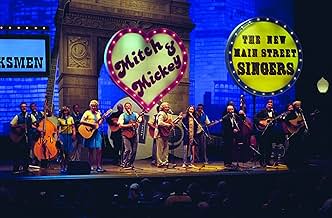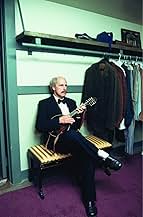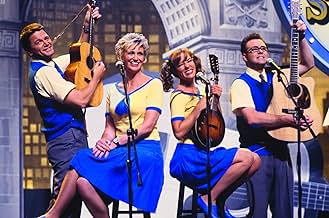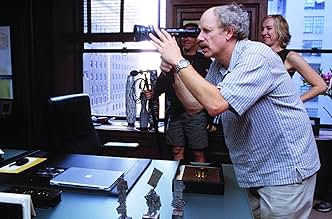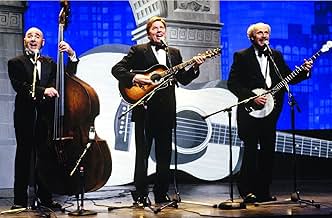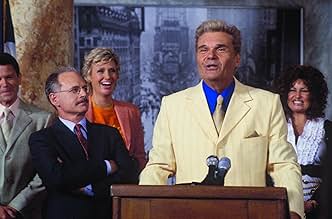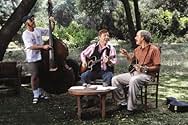IMDb-BEWERTUNG
7,2/10
29.942
IHRE BEWERTUNG
Mockumentary fängt die Wiedervereinigung des Folk-Trios The Folksmen aus den 1960er Jahren ein, als sie sich auf eine Show im Rathaus vorbereiten, um einem kürzlich verstorbenen Konzertveran... Alles lesenMockumentary fängt die Wiedervereinigung des Folk-Trios The Folksmen aus den 1960er Jahren ein, als sie sich auf eine Show im Rathaus vorbereiten, um einem kürzlich verstorbenen Konzertveranstalter zu gedenken.Mockumentary fängt die Wiedervereinigung des Folk-Trios The Folksmen aus den 1960er Jahren ein, als sie sich auf eine Show im Rathaus vorbereiten, um einem kürzlich verstorbenen Konzertveranstalter zu gedenken.
- Für 1 Oscar nominiert
- 14 Gewinne & 28 Nominierungen insgesamt
Marty Belafsky
- Ramblin' Sandy Pitnik
- (as Marty Belasky)
Michael S. Baser
- Pa Klapper
- (as Michael Baser)
Handlung
WUSSTEST DU SCHON:
- WissenswertesIn an early-'90s, and again in late 90's/ early 2000's, Spinal Tap tour, Michael McKean, Harry Shearer and Christopher Guest opened for themselves as The Folksmen and were booed during the first act, as people did not know or cared that the two bands had the same musicians.
- PatzerWhen the New Main Street Singers are playing at the reunion concert, members of the band move around between shots.
- Zitate
Terry Bohner: There was abuse in my family, but it was mostly musical in nature.
- Crazy CreditsAt the end of the film, before the traditional scrolling credits, the screen is filled with all the main actors' names. One at a time, each star's name is highlighted, in alphabetical order. The scrolling credits are in order of appearance.
- Alternative Versionen2003 DVD version uses the film's WB and Castle Rock logos with "An AOL Time Warner company" (along with WB distribution card at end). The 2016 Warner Archive Blu-ray keeps the logos roughly the same, but with slightly updated versions losing the AOL designation. (The trailer included on it retains the original AOL Time Warner logos from 2003.)
- VerbindungenFeatured in The 2004 IFP/West Independent Spirit Awards (2004)
- SoundtracksOld Joe's Place
Written by Christopher Guest, Harry Shearer and Michael McKean
Performed by The Folksmen
Ausgewählte Rezension
Christopher Guest's movies, like his performances, are generally subtle and always low-key. They are not for people who need laugh tracks to follow the humor and most of his work is so contextually-based that some knowledge of the subject he's dissecting is a definite asset. Guest, who was a performer in the very early SATURDAY NIGHT LIVE, is, in many respects, the Anti-Belushi of modern American comedy.
Nevertheless, he shares with Belushi - and many of their contemporaries, who came from one or another branch of the Second City organization - a certain fondness for off-the-wall elements in his work; Guest's tend to be slipped in, quietly, while Belushi's popped out of exploding cakes.
A MIGHTY WIND is a spot-on satire of the American Folk Music movement of the early and mid-1960s. The narrative conceit is a memorial concert for a recently deceased impressario, organized by his son, which reunites three folk groups from the 60s.
The real elements of the film are the send-ups of a variety of tropes of the era, musical styles, personalities, and quite an array of music-business cliches. Remarkably, however, the songs are genuinely entertaining in themselves; both the writing and the performances. They're satirical, but so subtlely performed that it's easy to loose the thread of the lyrics and wind up mindlessly nodding heads and grooving along, which pretty neatly captures the popular music experience for the last several generations. Satire within satire.
The musical performances are excellent, recreating, almost frighteningly, the taste and texture of folk music of the era. And, bringing several real 60s folk acts to mind.
The acting is typical of Guest movies, such as SPINAL TAP and BEST IN SHOW; very quiet, restrained, low-key, with, apparently, a lot of dialogue improvised. The performers are mostly drawn from the same group Guest has used in the past: Eugene Levy (who co-wrote the script with Guest) and Catherine O'Hara, Harry Shearer, Michael McKean, Ed Begley, Jr., and Guest, himself.
Comparisons with Guest's most popular picture, THIS IS SPINAL TAP are both interesting and tricky. Interesting because both movies were written and directed by the same man, and shared most of the same casts. Tricky, because while some seem to compare AMW unfavorably with TIST, a looking at these films, together, they have a lot in common. So much so, in fact, that it's reasonable to consider them a pair; very similar takes on two, distinct musical genres of a similar era. The writing, acting, tone, pacing of these two movies is very similar. The jokes are similar. The points of view are similar. The focus on both performers, and the behind-the-scenes people is similar. The real difference is the music.
This, in turn, tends to suggest that those who react very differently to these two films may be reacting more to the music, directly, and to the ambiance of the world around the particular musical genre more than anything else.
Guest's movies don't have many laugh-out-loud moments. Most of the humor is more the "big-smile", sometimes, the chuckle, kind. But, Ed Begley, Jr. has perhaps his best comic scene, ever, when he does a take as a Swedish-American public television producer dropping Yiddish into his conversation; one word per sentence. It's a totally dead-pan and very quiet performance which, like so much of Christopher Guest's humor, you will either get or not get. If you do, you may fall off your chair.
Eugene Levy, who co-wrote the script, with Guest, is also very good, having finally invented a second character after having spent something more than 30 years (since his Second City TV days) doing variations of one.
Who might enjoy A MIGHTY WIND? Anyone who remembers the era and the music, and anyone who enjoys show business insider takes. It's a more difficult call for those born later. And, if you have trouble keeping Janis Joplin and Joanie Mitchell distinct in your mind, you probably won't follow most of what's going on.
Nevertheless, he shares with Belushi - and many of their contemporaries, who came from one or another branch of the Second City organization - a certain fondness for off-the-wall elements in his work; Guest's tend to be slipped in, quietly, while Belushi's popped out of exploding cakes.
A MIGHTY WIND is a spot-on satire of the American Folk Music movement of the early and mid-1960s. The narrative conceit is a memorial concert for a recently deceased impressario, organized by his son, which reunites three folk groups from the 60s.
The real elements of the film are the send-ups of a variety of tropes of the era, musical styles, personalities, and quite an array of music-business cliches. Remarkably, however, the songs are genuinely entertaining in themselves; both the writing and the performances. They're satirical, but so subtlely performed that it's easy to loose the thread of the lyrics and wind up mindlessly nodding heads and grooving along, which pretty neatly captures the popular music experience for the last several generations. Satire within satire.
The musical performances are excellent, recreating, almost frighteningly, the taste and texture of folk music of the era. And, bringing several real 60s folk acts to mind.
The acting is typical of Guest movies, such as SPINAL TAP and BEST IN SHOW; very quiet, restrained, low-key, with, apparently, a lot of dialogue improvised. The performers are mostly drawn from the same group Guest has used in the past: Eugene Levy (who co-wrote the script with Guest) and Catherine O'Hara, Harry Shearer, Michael McKean, Ed Begley, Jr., and Guest, himself.
Comparisons with Guest's most popular picture, THIS IS SPINAL TAP are both interesting and tricky. Interesting because both movies were written and directed by the same man, and shared most of the same casts. Tricky, because while some seem to compare AMW unfavorably with TIST, a looking at these films, together, they have a lot in common. So much so, in fact, that it's reasonable to consider them a pair; very similar takes on two, distinct musical genres of a similar era. The writing, acting, tone, pacing of these two movies is very similar. The jokes are similar. The points of view are similar. The focus on both performers, and the behind-the-scenes people is similar. The real difference is the music.
This, in turn, tends to suggest that those who react very differently to these two films may be reacting more to the music, directly, and to the ambiance of the world around the particular musical genre more than anything else.
Guest's movies don't have many laugh-out-loud moments. Most of the humor is more the "big-smile", sometimes, the chuckle, kind. But, Ed Begley, Jr. has perhaps his best comic scene, ever, when he does a take as a Swedish-American public television producer dropping Yiddish into his conversation; one word per sentence. It's a totally dead-pan and very quiet performance which, like so much of Christopher Guest's humor, you will either get or not get. If you do, you may fall off your chair.
Eugene Levy, who co-wrote the script, with Guest, is also very good, having finally invented a second character after having spent something more than 30 years (since his Second City TV days) doing variations of one.
Who might enjoy A MIGHTY WIND? Anyone who remembers the era and the music, and anyone who enjoys show business insider takes. It's a more difficult call for those born later. And, if you have trouble keeping Janis Joplin and Joanie Mitchell distinct in your mind, you probably won't follow most of what's going on.
Top-Auswahl
Melde dich zum Bewerten an und greife auf die Watchlist für personalisierte Empfehlungen zu.
- How long is A Mighty Wind?Powered by Alexa
Details
- Erscheinungsdatum
- Herkunftsland
- Offizieller Standort
- Sprachen
- Auch bekannt als
- Untitled Christopher Guest Project
- Drehorte
- Produktionsfirma
- Weitere beteiligte Unternehmen bei IMDbPro anzeigen
Box Office
- Bruttoertrag in den USA und Kanada
- 17.781.006 $
- Eröffnungswochenende in den USA und in Kanada
- 2.112.140 $
- 20. Apr. 2003
- Weltweiter Bruttoertrag
- 18.750.246 $
- Laufzeit1 Stunde 31 Minuten
- Farbe
- Sound-Mix
- Seitenverhältnis
- 1.85 : 1
Zu dieser Seite beitragen
Bearbeitung vorschlagen oder fehlenden Inhalt hinzufügen








